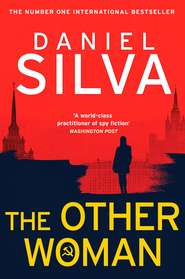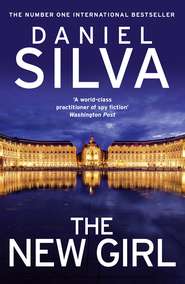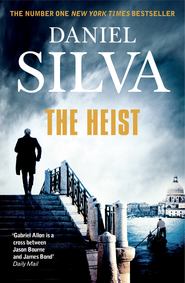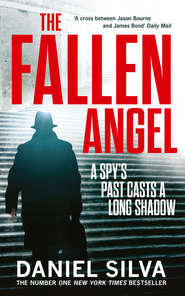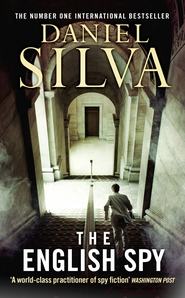По всем вопросам обращайтесь на: info@litportal.ru
(©) 2003-2024.
✖
The English Girl
Автор
Год написания книги
2018
Настройки чтения
Размер шрифта
Высота строк
Поля
Twenty-five, thought Gabriel. Why did it have to be twenty-five? He looked at his wristwatch again. Not at the time. The date.
“What were your instructions?” he asked of the driver, who just happened to be twenty-five.
“I was told to take you to Ben Gurion.”
“Anything else?”
“They said you might want to make a stop along the way.”
“Who said that? Was it Uzi?”
“No,” replied the driver, shaking his head. “It was the Old Man.”
So, thought Gabriel. He remembered. He glanced at his watch again. The date …
“Well?” asked the driver.
“Take me to the airport,” replied Gabriel.
“No stops?”
“Just one.”
The driver slipped the car into gear and eased slowly from the curb, as though he were joining a funeral procession. He didn’t bother to ask where they were going. It was the twenty-seventh of September. And Shamron remembered.
They drove to the Garden of Gethsemane and then followed the narrow, winding path up the slope of the Mount of Olives. Gabriel entered the cemetery alone and walked through the sea of headstones, until he arrived at the grave of Daniel Allon, born September 27, 1988, died January 13, 1991. Died on a snowy night in the First District of Vienna, in a blue Mercedes automobile that was blown to bits by a bomb. The bomb had been planted by a Palestinian master terrorist named Tariq al-Hourani, on the direct orders of Yasir Arafat. Gabriel had not been the target; that would have been too lenient. Tariq and Arafat had wanted to punish him by forcing him to watch the death of his wife and child, so that he would spend the rest of his life grieving, like the Palestinians. Only one element of the plot had failed. Leah had survived the inferno. She lived now in a psychiatric hospital atop Mount Herzl, trapped in a prison of memory and a body destroyed by fire. Afflicted with a combination of post-traumatic stress syndrome and psychotic depression, she relived the bombing constantly. Occasionally, however, she experienced flashes of lucidity. During one such interlude, she had granted Gabriel permission to marry Chiara. Look at me, Gabriel. There’s nothing left of me. Nothing but a memory.
Gabriel glanced at his wristwatch again. Not the date but the time. There was time for one last good-bye. One final torrent of tears. One final apology for failing to search the car for a bomb before allowing Leah to start the engine. Then he staggered from the garden of stone, on the day that used to be his favorite of the year, and climbed into the back of an Office sedan that was driven by a boy of twenty-five.
The boy had the good sense not to speak a word during the journey to the airport. Gabriel entered the terminal like a normal traveler but then went to a room reserved for Office personnel, where he waited for his flight to be called. As he settled into his first-class seat, he felt a wholly unprofessional urge to phone Chiara. Instead, using techniques taught to him in his youth by Shamron, he walled her from his thoughts. For now, there was no Chiara. Or Daniel. Or Leah. There was only Madeline Hart, the kidnapped mistress of British prime minister Jonathan Lancaster. As the plane rose into the darkening sky, she appeared to Gabriel, in oil on canvas, as Susanna bathing in her garden. And leering at her over the wall was a man with an angular face and a small, cruel mouth. The man without a name or country. The forgotten man.
7 (#ulink_5620afce-432a-55e8-aaac-cf4d2a45b20b)
CORSICA (#ulink_5620afce-432a-55e8-aaac-cf4d2a45b20b)
THE CORSICANS SAY that, when approaching their island by boat, they can smell its unique scrubland vegetation long before they glimpse its rugged coastline rising from the sea. Gabriel experienced no such revelation of Corsica, for he journeyed to the island by air, arriving on the morning’s first flight from Orly. It was only when he was behind the wheel of a rented Peugeot, heading south from the airport at Ajaccio, that he caught his first whiff of gorse, briar, rockrose, and rosemary spilling down from the hills. The Corsicans called it the macchia. They cooked with it, heated their homes with it, and took refuge in it in times of war and vendetta. According to Corsican legend, a hunted man could take to the macchia and, if he wished, remain undetected there forever. Gabriel knew just such a man. It was why he wore a red coral hand on a strand of leather around his neck.
After a half hour of driving, Gabriel left the coast road and headed inland. The scent of the macchia grew stronger, as did the walls surrounding the small hill towns. Corsica, like the ancient land of Israel, had been invaded many times—indeed, after the fall of the Roman Empire, the Vandals had plundered Corsica so mercilessly that most of the island’s inhabitants fled the coasts and retreated into the safety of the mountains. Even now, the fear of outsiders remained intense. In one isolated village, an old woman pointed at Gabriel with her index and little fingers in order to ward off the effects of the occhju, the evil eye.
Beyond the village, the road was little more than a single-lane track bordered on both sides by thick walls of macchia. After a mile he came to the entrance of a private estate. The gate was open but in the breach stood an off-road vehicle occupied by a pair of security guards. Gabriel switched off the engine and, placing his hands atop the steering wheel, waited for the men to approach. Eventually, one climbed out and came slowly over. He had a gun in one hand and another shoved into the waistband of his trousers. With only a movement of his thick eyebrows, he inquired about the purpose of Gabriel’s visit.
“I wish to see the don,” Gabriel said in French.
“The don is a very busy man,” the guard replied in the Corsican dialect.
Gabriel removed the talisman from his neck and handed it over. The Corsican smiled.
“I’ll see what I can do.”
It had never taken much to spark a blood feud on the island of Corsica. An insult. An accusation of cheating in the marketplace. The dissolution of an engagement. The pregnancy of an unmarried woman. After the initial spark, unrest inevitably followed. An ox would be killed, a prized olive tree would topple, a cottage would burn. Then the murders would start. And on it would go, sometimes for a generation or more, until the aggrieved parties had settled their differences or given up the fight in exhaustion.
Most Corsican men were more than willing to do their killing themselves. But there were some who needed others to do their blood work for them: notables who were too squeamish to get their hands dirty, or who were unwilling to risk arrest or exile; women who could not kill for themselves or had no male kin to do the deed on their behalf. People like these relied on professional killers known as taddunaghiu. Usually, they turned to the Orsati clan.
The Orsatis had fine land with many olive trees, and their oil was regarded as the sweetest in all of Corsica. But they did more than produce olive oil. No one knew how many Corsicans had died at the hands of Orsati assassins down through the ages, least of all the Orsatis themselves, but local lore placed the number in the thousands. It might have been significantly higher were it not for the clan’s rigorous vetting process. The Orsatis operated by a strict code. They refused to carry out a killing unless satisfied the party before them had indeed been wronged and blood vengeance was required.
That changed, however, with Don Anton Orsati. By the time he gained control of the family, the French authorities had managed to eradicate feuding and the vendetta in all but the most isolated pockets of the island, leaving few Corsicans with the need for the services of his taddunaghiu. With local demand in steep decline, Orsati had been left with no choice but to look for opportunities elsewhere, namely, across the water in mainland Europe. He now accepted almost every job offer that crossed his desk, no matter how distasteful, and his killers were regarded as the most reliable and professional on the Continent. In fact, Gabriel was one of only two people ever to survive an Orsati family contract.
Though Orsati descended from a family of Corsican notables, in appearance he was indistinguishable from the paesanu who guarded the entrance to his estate. Entering the don’s large office, Gabriel found him seated at his desk wearing a bleached white shirt, loose-fitting trousers of pale cotton, and a pair of dusty sandals that looked as though they had been purchased at the local outdoor market. He was staring down at an old-fashioned ledger, his heavy face set in a frown. Gabriel could only wonder at the source of the don’s displeasure. Long ago, Orsati had merged his two businesses into a single seamless enterprise. His modern-day taddunaghiu were all employees of the Orsati Olive Oil Company, and the murders they carried out were booked as orders for product.
Rising, Orsati extended a granite hand toward Gabriel without a trace of apprehension. “It is an honor to meet you, Monsieur Allon,” he said in French. “Frankly, I expected to see you long ago. You have a reputation for dealing harshly with your enemies.”
“My enemies were the Swiss bankers who hired you to kill me, Don Orsati. Besides,” Gabriel added, “instead of giving me a bullet in the head, your assassin gave me that.”
Gabriel nodded toward the talisman, which was lying on Orsati’s desk next to the ledger. The don frowned. Then he picked up the charm by the leather strand and allowed the red coral hand to sway back and forth like the weight of a clock.
“It was a reckless thing to do,” the don said at last.
“Leaving the talisman behind or letting me live?”
Orsati smiled noncommittally. “We have an old saying here in Corsica. I solda un vènini micca cantendu: Money doesn’t come from singing. It comes from work. And around here, work means fulfilling contracts, even when they are taken out on famous violinists and Israeli intelligence officers.”
“So you returned the money to the men who retained you?”
“They were Swiss bankers. Money was the last thing they needed.” Orsati closed the ledger and laid the talisman on the cover. “As you might expect, I’ve been keeping a close eye on you over the years. You’ve been a very busy man since our paths crossed. In fact, some of your best work has been done on my turf.”
“This is my first visit to Corsica,” Gabriel demurred.
“I was referring to the south of France,” Orsati replied. “You killed that Saudi terrorist Zizi al-Bakari in the Old Port of Cannes. And then there was that bit of unpleasantness with Ivan Kharkov in Saint-Tropez a few years ago.”
“It was my understanding Ivan was killed by other Russians,” Gabriel said evasively.
“You killed Ivan, Allon. And you killed him because he took your wife.”
Gabriel was silent. Again the Corsican smiled, this time with the assurance of a man who knew he was right. “The macchia has no eyes,” he said, “but it sees all.”
“That’s why I’m here.”
“I assumed that was the case. After all, a man such as you surely has no need of a professional killer. You do that quite well all on your own.”
Gabriel withdrew a bundle of cash from his coat pocket and placed it on Orsati’s ledger of death, next to the talisman. The don ignored it.
“How can I help you, Allon?”
“I need some information.”
“About?”
Without a word, Gabriel laid the photograph of Madeline Hart next to the money.






